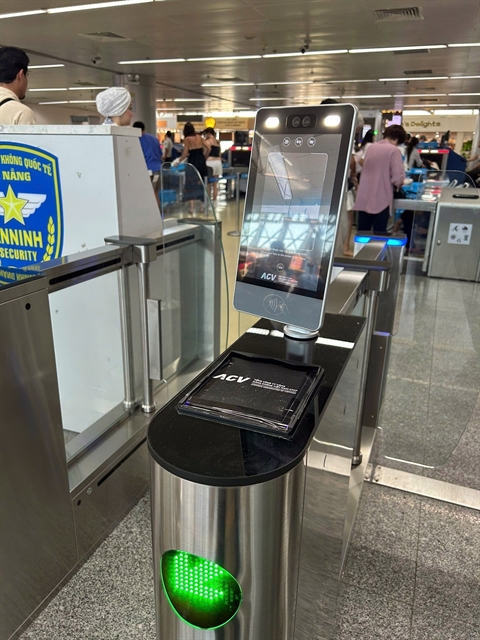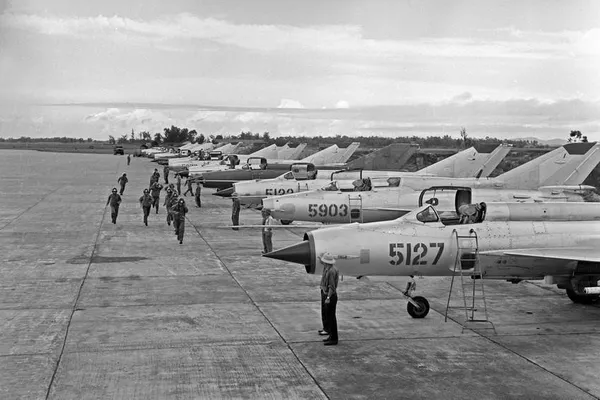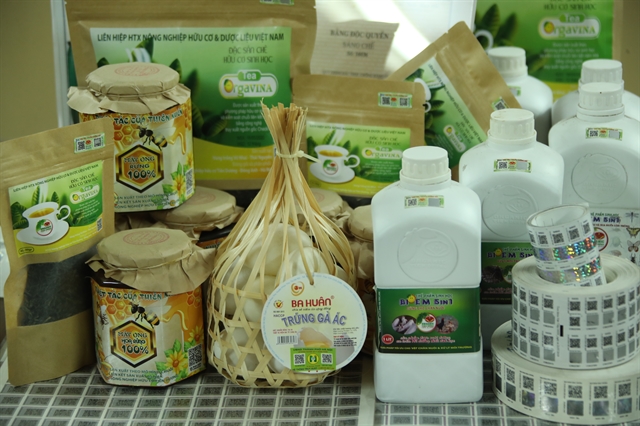 Economy
Economy

Hà Nội was strengthening trade promotion activities for farm produce to establish sustainable value chains and build a resilient agriculture because of the COVID-19 pandemic.

|
| Agricultural products of Hà Nội with QR Codes for origin tracing. Hà Nội was strengthening trade promotion activities for farm produce to establish sustainable value chains. — VNS Photo |
HÀ NỘI — Hà Nội was strengthening trade promotion activities for farm produce to establish sustainable value chains and build a resilient agriculture because of the COVID-19 pandemic.
“Bối Khê fragrant rice” has seen stable sales not only domestically but also in foreign markets since it was recognised as a collective trademark by the Intellectual Property Office of Việt Nam in 2015.
Director of Tam Hưng Agriculture Co-operative in Tam Hưng Commune, Thanh Oai District Đỗ Văn Kiên which owned the trademark said the cooperative received a lot of support to participate in trade promotion activities to introduce its rice products. In 2020, the co-operative sold a total 4,500 tonnes rice.
According to Trần Minh Đức, director of Trường Thịnh High Technology Agriculture Investment Joint Stock Company which cooperated with farmers in Dương Nội Ward, Hà Đông District to cultivate Japanese melon following GlobalGap standards, trade promotion activities helped expand market for this product.
Trường Thịnh now had contracts with Green Path Viet Nam Trading and Import Export Joint Stock Company, Safe Meal Group Corporation and several supermarkets. The company was also conducting procedures to export melons to Japan.
Deputy Director of the municipal Department of Agriculture and Rural Development Tạ Văn Tường said that in recent years, the capital city’s agriculture saw significant renovations in the way trade promotion activities were implemented.
Every problem encountered during the distribution of farm produce and every proposal of distribution firms and producers were listened to ensure a smooth process from production to distribution, Tường stressed.
Tường said that the department cooperated with unions to raise farmers’ awareness about safe agricultural production as well as to provide support to improve their farming techniques.
According to Nguyễn Thị Thu Hằng, the Hà Nội Sub-Department of Agro-Forestry-Fisheries Quality Assurance, it was necessary to develop agricultural products which met quality standards to promote the capital city’s development and increase competitiveness.
Trade promotion activities must focus on taking opportunities arising from the free trade agreements to expand markets for agricultural products while limiting negative impacts of the COVID-19 pandemic, she said.
Director of Hà Nội Department of Agriculture and Rural Development Chu Phú Mỹ said focus would be placed on studying and analysing market demand to provide orientations for agricultural production, ensuring both quality and quantity.
The organisation of trade fairs and agricultural product weeks was an effective solution to promote trade but it must be tied to the actual demand of the market as well as carefully considered in the context of the COVID-19 pandemic, he said.
Mỹ stressed that this year, Hà Nội would give priority to promoting products within the one-commune-one-product (OCOP) programme and organising fairs following harvesting seasons.
He also urged enterprises to strengthen the application of information technology in distributing agricultural products, adding that the department would provide support to establish online distribution channels which played an important role because of the pandemic.
Nguyễn Văn Chữ, director of Organic Green Clean Food Company Limited said that the combination of traditional and online distribution channels was appropriate in the current situation to establish a diversified distribution network which would help access more consumers.
Trade promotion activities also contributed to improving product quality, building brands, establishing sustainable supply chains for agricultural products in the capital city and build a resilient agriculture. — VNS